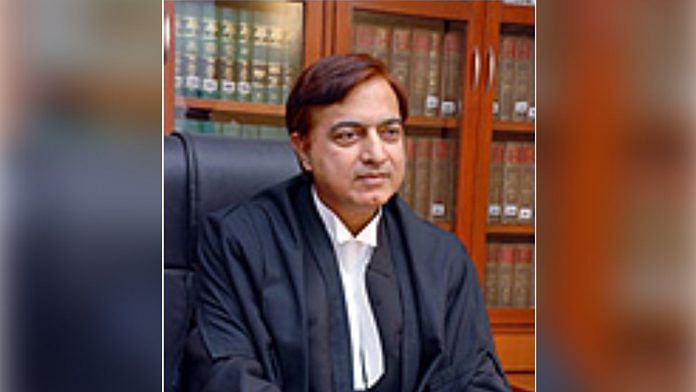New Delhi: Days after he passed an order paving the way for the arrest of former Union minister P. Chidambaram, now-retired Justice Sunil Gaur has been appointed as the chairperson of the Appellate Tribunal for Prevention of Money Laundering Act (ATPMLA), ThePrint has learnt.
The former Delhi High Court justice is set to take over on 23 September, a day after present ATPMLA chairperson Justice Manmohan Singh retires, a top source in the tribunal told ThePrint.
In his last order on 20 August — two days before he retired from the Delhi HC — Justice Gaur had dismissed Chidambaram’s plea to grant him interim protection from arrest by the Central Bureau of Investigation (CBI) in the INX Media case.
The 62-year-old judge had described the Congress leader as the “kingpin” in the money laundering case. The lawyers for Chidambaram had alleged that Gaur reproduced a note — forwarded by the CBI in a sealed cover after the arguments closed — verbatim.
Earlier, Gaur had also passed an order clearing the decks for prosecution of top Congress leaders, including Sonia and Rahul Gandhi, in the National Herald case.
He had also delivered a verdict in 2018 directing Associated Journals Ltd, the publisher of National Herald, to vacate its offices at ITO in the national capital. The decision was later upheld by a division bench of the HC, but was put on hold by the Supreme Court in April this year. The matter is still pending in the apex court.
Gaur’s career
Justice Sunil Gaur was elevated to the Delhi High Court in April 2008. He was designated as a permanent judge in April 2012.
In his over-three-decade long legal career, Justice Gaur adjudged several high profile cases. His area of expertise lay in dealing with corruption cases, including the money laundering case against controversial meat exporter Moin Qureshi that drove a wedge inside the CBI last year.
Earlier this month, the former Delhi HC judge also set aside a trial court order allowing criminal prosecution of Reliance Industries Ltd (RIL) and its then three senior officials for allegedly possessing secret documents pertaining to cabinet meetings on economic matters.
The case related to recovery of four secret documents pertaining to government policies on subjects of interest to Reliance Industries Ltd from the company’s office. It was stated that there was a prima facie case made out against RIL and the officials under the Official Secrets Act (OSA).
Prior to his high court tenure, Gaur handled civil and criminal cases in Delhi Higher Judicial Service, including the sensational Shivani Bhatnagar murder trial. He also served as judge-in-charge of Delhi Mediation Centre, Tis Hazari Courts, and Karkardooma Courts, in Delhi.
Also read: High courts are diluting SC/ST Act, ignoring Modi govt’s amendments
Cooling-off period
In February this year, the Modi government had ruled out a cooling-off period for retired judges before their appointment to tribunals or commissions.
The trend of judges taking up post-retirement posts has drawn heavy criticism over the years.
Apart from the chairperson, the other two members of the appellate tribunal are G.C. Mishra and Ananya Ray. Mishra is a former officer at the Department of Legal Affairs, Ministry of Law and Justice. Ray is an Indian Revenue Service officer who was formerly special secretary to the Government of India and Member Customs, Central Board of Excise and Customs.
Also read: Why CJI Gogoi picked this Delhi judge to hear the Unnao rape case
This report was updated to correct the day of Sunil Gaur’s retirement.




This is why a “cooling off” period is necessary- to ensure blandishments do not affect judicial impartiality. Otherwise we will continue to have such examples. Why blame Justice Gaur if a former CJI becomes Governor of a state after retirement- what example is he setting?
The appointment to Tribunal PMLA is reward Nd an eye opener how our system works. HC& SC Judges should not be provided any judicial post as it affects their impartiality Nd lures them to become yesmen of ruling elite
His own judgement as judge will come for appeal. This is travesty of legal process. He should have given some other position.it is patently wrong to head policy PMLA tribunal as he was judge of same court upto yesterday.
Why cant they simply retire and pave way for the next generation of bright young legal luminaries who can prove their mettle. Why
60+ cling to power and deprive others? In short they don’t wish to let go off power, perks, authority. Pre decided verdicts are rewarded with suitable posts by Govt of the day.
Just imagine,
PC bail allowed by Justice gaur and he retires.
Lol
librandus are real hypocrites
Because he handled many high profile cases he became a high profiled personality and become a natural choice for further extension of service and rewarded suitably before laying down his office. Now every wrongdoing of past governments are rectified.
Even a tiny tot can understand his final order was dictated by his political bosses; and this present assignment is a reward for that order. But it is a shame on a High Court for using such adjectives he used in his order at a time, when fleecing 30, 000 crores doesn’t attract any adjectives.
Court and judges in our country are looked upon as the temples of last resort to get justice. If the judge does not dispense justice with a clear conscience, in an unbiased way, only God can help the aggrieved. Of course, God will do that. And for the dispensation of injustice, I don’t know from whom the judge can seek pardon.
Corrupt judge without a conscience or a heart
He is handsomely awarded for his good work.